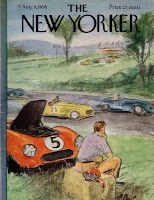Plath received a first reading contract from The New Yorker on 28 February 1961, while she was recovering in hospital from having her appendix removed. The contract came with a check for $100, and meant that Plath would send all her new poetry to them first.
To that point, Plath had placed six poems with The New Yorker. Beginning with her first publication of "Mussel Hunter at Rock Harbor" in the 9 August 1958 issue (pictured above), she published also:
"Night Walk" (later "Hardcastle Crags") on 11 October 1958;
"A Winter's Tale" on 12 December 1959;
"Man in Black" on 9 April 1960;
"Water Color of Grantchester Meadows (Cambridge, England)" on 28 May 1960; and
"The Net Menders" on 20 August 1960.
Did you know that in Plath's lifetime, after she signed this contract, The New Yorker accepted only three additional poems? "On Deck" appeared on 22 July 1961; "Tulips" appeared on 7 April 1962; and "Blackberrying" on September 15, 1962.
From the time she signed this contract, which was renewed in 1962, Plath had slightly greater success publishing poems in rival magazines such as Harper's, and literary journals such as London Magazine and Poetry.


